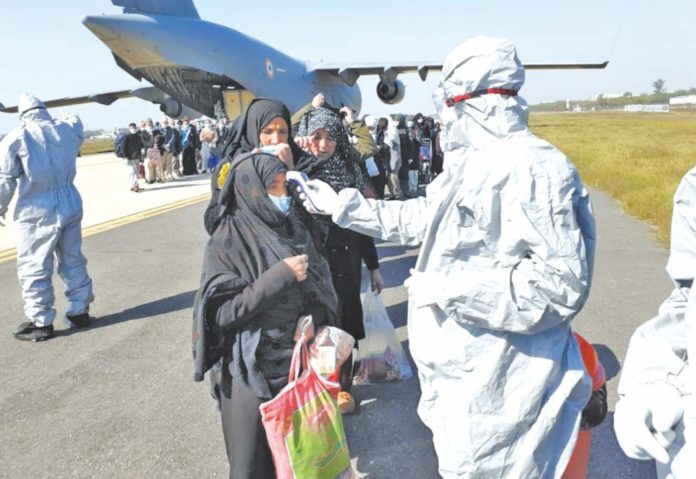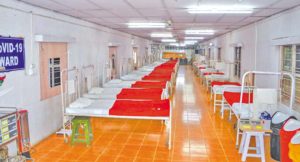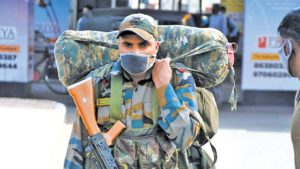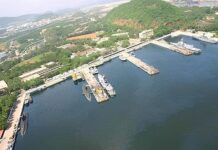
Armed Forces have been working relentlessly to provide medical and logistics support to civil authorities in the country’s fight against COVID-19 pandemic. The Armed Forces Medical Services (AFMS) have deployed all resources at its disposal to aid the civilian authorities, shouldering responsibility in the time of extraordinary crisis.
The Army sent instructions to augment medical facilities and infrastructure. These included:
- Increasing the capacity for surveillance and isolation at Military, Base and Command Hospitals.
- Setting up a 45-bed isolation facility and a 10-bed ICU facility at field hospitals exclusively for COVID-19 patients at six hours’ notice.
- Keeping 30 per cent of field hospitals on standby for constructing COVID hospitals in COVID hotspots.
- Preparing Quick Reaction Medical Teams to mobilise at six hours’ notice.
Armed Forces Hospitals Geared Up
Twenty-eight hospitals of the army, air force and navy across India were earmarked, by 28 March, as COVID-19 hospitals to handle and treat coronavirus cases, which was part of the measures of the defence forces to help civil authorities.
Separately, five hospitals of the three defence services can carry out COVID testing. These include Army Hospital Research and Referral, Delhi; Command Hospital Air Force, Bangalore and Armed Forces Medical College, Pune; Command Hospital (Central Command) Lucknow; Command Hospital (Northern Command) Udhampur. Six additional hospitals were also being equipped with the resources to begin such testing.
Some of the major hospitals among the 28 earmarked are – Military Hospital Avadi, Base Hospital Lucknow, Military Hospital Gaya, Military Hospital Belgaum, Military Hospital Patiala, Military Hospital Panagarh, INHS (Indian Naval Hospital Ship) Nivarini in Odisha, INHS Jeevanti in Goa and 4 Air Force Hospital in Kalaikunda. Other hospitals are at Dimapur, Suratgarh, Ahmedabad, Akhnoor, Hindon, Karwar, Golconda and Bangalore.

The hospitals have prepared logistics plans for evacuation, establishing isolation facilities and treatment areas, and manpower and equipment management. Placement of medical and paramedical staff with the necessary equipment for handling these cases had started.
The new facilities to be setup are separate from the existing isolation facilities that are already part of these hospitals. These hospitals are in addition to the ones that have already been converted to handle coronavirus cases of the armed forces and civilians, following the setting up of isolation wards.
For formations along the Line of Control (LoC) with Pakistan and Line of Actual Control (LAC) with China, isolation wards at peripheral hospitals have been geared up.
The Indian Air Force’s (IAF) Command Hospital Air Force Bangalore (CHAFB) has been designated as the first laboratory in the air force to undertake COVID-19 testing. The IAF has nine quarantine facilities, each with 200-300 personnel capacity each, at nodal IAF bases across the country.
The Indian Navy has set up isolation facilities at its premier hospital INHS Asvini at Mumbai to treat Covid-19 cases. The Navy’s Command Headquarters at Kochi and Vizag have also been directed to set up similar facilities. Separate “Fever Clinics” are functioning at all naval hospitals to prevent the spread of infection from undiagnosed cases.
Evacuation and Quarantine
Indians and foreigners evacuated from COVID-19 affected countries were housed and observed at six quarantine facilities run by the Armed Forces at Manesar, Jaisalmer, Jodhpur, Chennai, Hindan and Mumbai. These included evacuees from Iran, Italy, China, Japan and Malaysia besides IAF evacuation flight crew.
In addition to the active quarantine centres, more facilities were made operational at Kolkata, Visakhapatnam, Kochi, Dundigal near Hyderabad, Bengaluru, Kanpur, Jaisalmer, Jorhat and Gorakhpur.
Precautionary Measures
A number of measures were taken by the Indian Army to prevent the pandemic among its personnel so that the Army personnel were available to do their primary task and support the people in the fight against Covid.
Intensive information, education and communication campaigns were launched for serving personnel. Leave extension of those on leave as well as curtailment of leave to bare minimum was imposed. Segregation facilities were set up to observe troops already back from leave from various states.
Arrangements were made for troops returning from leave or out-station duties reporting to screening centres established at various transit camps. After the medical screening they were being quarantined for 14 days in the quarantine room established in the units.

Advisories were issued by AFMS on social distancing, cancellation of courses and training, use of masks, preventive measures to be taken at workplace and guidelines on COVID surveillance and contact tracing.
The Military Operations Directorate issued directions to curtail leave. All troops returning from leave, especially from Covid hotspots were screened and quarantined on arrival.
Training activities, including collective training activities scheduled at units and brigades, were postponed or cancelled. Physical training and games continued with the required minimum distance between individuals.
All courses due to start from March 23 or afterwards were postponed. Non-essential conferences and seminars involving moving personnel may were cancelled or postponed. Entry to essential stores and CSD was regulated and later cancelled.
While the army continued to function normally on the borders, officers posted in headquarters – who amount to 40 per cent of the overall cadre – were asked to function from home.
In the barracks to avoid congestion, distance between the beds has been increased, to avoid crowding in dining halls, meals are served at staggered timings, social distancing is being maintained and adequate hand-washing points are in place.
Assistance to Maldives
A 14-member team of medical officers and paramedical staff of Army Medical Corps was sent to the Maldives for capacity building measures and assist in setting up their own testing, treatment and quarantine capacities. The team stayed in the Maldives for 10 days and returned on 23 March 2020. AFMS was ready to dispatch a Rapid Response Team to Nepal and other countries for assisting them with the COVID situation.
At Sea
The Indian Navy put in a series of precautionary measures to prevent any outbreak on its ships by minimising port calls at foreign shores and continuous medical monitoring of its sailors.
The Navy has more than 20 ships out at sea at any point in time which includes coastal patrols and harbour patrols, besides the mission-based deployments in international waters. More than 3,000 naval personnel are on board these vessels. These measures call for significant logistics support, including critical fuel supply to naval ships.
The Navy has taken to replenishment at sea, including refuelling of ships in international waters using its own vessels deployed as part of Operation Sankalp, which started in July 2019 in the Gulf of Oman, anti-piracy missions near the Gulf of Aden, and naval deployment for patrolling a strategic choke point of the Strait of Malacca.
The Navy also instituted measures to continuously monitor the health and symptoms of its personnel who are part of any planned sailing. Medical teams on board vessels were monitoring the health of personnel. This became critical after US sailors on a US navy ship, with 5,000 US military personnel onboard, tested positive for coronavirus.
Personal Protective Equipment
Provision of Personal Protective Equipment (PPE) was a challenge with adequate quantities only for use in hospitals. Additional procurement was being planned to tide over the crisis, since the Armed Forces were directed to augment medical resources for the civil health set up.
Northern Command
17 helplines were established by Northern Command in the Union Territories of Jammu & Kashmir (J&K) and Ladakh for the civilian population. Mobile vehicle check posts, which are usually deployed for counter terrorist operations, were educating the population on Covid-19 by way of audio broadcasts through loudspeakers. Posters and banners were also pasted at multiple places in Urdu, Hindi and English.
Ordnance Factory Board
The Ordnance Factory Board (OFB), which produces arms, ammunition and equipment for the military, has separately designated 285 beds as Covid-19 quarantine facilities. These include 40 beds in Jabalpur, thirty beds each at Ishapore, Cossipore, Khadki, Kanpur, Khamaria and Ambajhari; 25 beds at Ambernath and 20 beds each at Avadi and Medak.
The Ordnance Factory Board (OFB) is utilizing its facilities to try and manufacture personal protection equipment and face masks, in accordance with a pilot order placed by HLL Lifecare Limited, a public sector unit under the Ministry of Health and Family Welfare.
Comments
With almost 7,000 specialists and super specialists spread across India, and over 130 hospitals, military medicine is an asset that rarely comes into limelight. Supported by thousands of nursing officers and more than 40,000 paramedics, AFMS is the medical backbone on which the three Services have survived over the years. And this is the backbone to which India turned to when a unique medical crisis threatened from across the borders.
Over the years, medical cases have included everything between combat wounds, high altitude ailments and childbirth. This is only possible because of the unique dedication of military medical personnel. In India, there is no state-run medical service like the AFMS.
Military hospitals are even more remarkable for their specialised facilities are on par with the most expensive and posh private sector establishments. Other than the various AIIMS hospitals set up across India, there is no state-run medical service that can match what the military has managed.

















